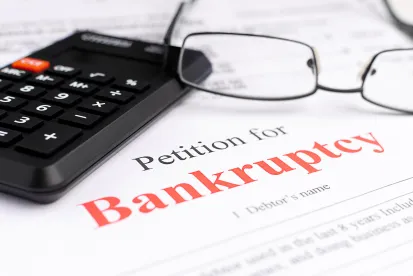As discussed in prior posts (here, here and here), in 2019 Congress passed the Small Business Reorganization Act creating new Subchapter V of Chapter 11 of the Bankruptcy Code. The purpose of Subchapter V was to make small business bankruptcies faster and less expensive. However, the substantial benefits of Subchapter V may come at a cost for small businesses.
The Fourth Circuit’s recent decision In re Cleary Packaging, LLC, 2022 WL 2032296 (4th Cir. June 7, 2022) clarified that in certain Subchapter V cases the statutory exceptions to the bankruptcy discharge will apply to corporate debtors. This is a significant shift in the law of corporate reorganization under Chapter 11 of the Bankruptcy Code. Small business lenders may want to consider pursuing non-dischargeability claims in bankruptcy cases filed under Subchapter V.
In re Cleary Packaging, LLC
The dispute over the discharge exception that reached the Fourth Circuit started with a state court judgment. Cantwell-Cleary Co., Inc. obtained an over $4 million judgment against Cleary Packaging, LLC, a company formed by Cantwell-Cleary’s former president and CEO. The state court action alleged intentional interference with contracts, tortious interference with business relations, and related claims. In response to the judgment, Cleary Packaging filed a petition under Chapter 11 of the Bankruptcy Code, electing to proceed under Subchapter V. In its bankruptcy plan, Cleary Packaging proposed to pay Cantwell-Cleary only 2.98% of its judgment, with the remainder of the debt to be discharged. Cantwell-Cleary filed an adversary proceeding seeking a determination that the state court judgment was a debt for “willful and malicious injury” that was not dischargeable under Sections 1192 and 523(a)(6) of the Bankruptcy Code. If Cantwell-Cleary prevailed, it meant that Cleary Packaging would not be relieved of the judgment in bankruptcy. The bankruptcy court dismissed Cantwell-Cleary’s action, holding that the discharge exceptions in § 523(a) do not apply to corporate debtors. On direct appeal, the Fourth Circuit decided the sole question of whether Cleary Packaging, as a Subchapter V corporate debtor, can discharge its over $4 million debt to Cantwell-Cleary “for willful and malicious injury.”
Discharge of debts under Subchapter V is governed by § 1192(2). That section provides: “If the plan of the debtor is confirmed … the court shall grant the debtor a discharge of all debts … except any debt … of the kind specified in section 523(a) of this title.” In turn, § 523(a) provides that discharges in specified bankruptcy code discharge provisions, including § 1192 which applies in Subchapter V, do not discharge an individual debtor from the 21 types of debt listed in the statute. The bankruptcy court read this provision as limiting the exceptions to discharge solely to individual Subchapter V debtors. On appeal, the Fourth Circuit concluded that in Subchapter V cases where the debtor does not confirm a consensual plan, the discharge exceptions in § 523(a) apply to both individual and corporate debtors.
The Fourth Circuit first turned to the text of § 1192(2), which provides a discharge of “debtors.” Under Bankruptcy Code definitions, this term includes both individuals and corporations, and it makes sense that there be no distinction in the discharge that is applied to these debtors. This is also consistent with Subchapter V’s exclusion of the application of the exception to a corporate discharge found in § 1141(d) upon a liquidation, thus eliminating the distinction between a discharge for an individual and an entity upon a liquidation. The court also focused on the language of § 1192(2), which states that it excepts from discharge “any debt … of the kind specified in section 523(a).” The Fourth Circuit found the use of the word “debt” to be decisive, as it does not lend itself to encompass the “kind” of debtors discussed in § 523(a). Further, the court found the combination of the terms “debt” and “of the kind” indicative of Congressional intent to reference only the list of non-dischargeable debts found in § 523(a).
The Fourth Circuit also held that its interpretation serves fairness and equity. A Subchapter V debtor can confirm a non-consensual plan — i.e., a “cram-down” plan — in which business owners may maintain their equity ownership without paying the business’s creditors in full. This is a drastic change from traditional Chapter 11 cases that are governed by what is known as the “absolute priority rule.” Because an eligible small business corporate debtor is given greater relief in Subchapter V, they should not receive a discharge of debts for fraud, willful and malicious injury, and the other violations of public policy reflected in § 523(a)’s list of exceptions to the discharge.
Practical Application
Generally, in a traditional Chapter 11, exceptions to discharge for corporate debtors are more limited if the corporation is not liquidating. Based on the Fourth Circuit’s decision in In re Cleary Packaging, LLC, Subchapter V includes broader exceptions to discharge for a debtor that cannot confirm a consensual plan, including claims against corporate debtors for certain types of fraud and other willful and malicious injuries.
Practitioners and small business lenders should be cognizant of the applicable exceptions to discharge in Subchapter V and determine whether they need to file an adversary proceeding to declare such debts non-dischargeable. And, if seeking such relief, it is crucial to keep in mind that the Bankruptcy Code and Bankruptcy Rules provide strict deadlines for filing these adversary proceedings.





 />i
/>i

